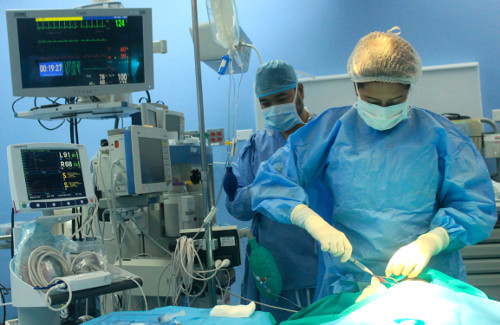Anesthesia in Congenital Cardiac Diseases
What is done during the preoperative evaluation?
Preoperative evaluation should include a complete medical history with a special emphasis on the antecedents prior to surgery that could complicate the course of surgery such as heart failure, respiratory diseases (common cold), etc., which are the most common and that must be optimized to take the child in the best conditions.
It also evaluates if the child has any allergies to medications and even foods such as eggs or shellfish.
The medication is usually continued until the day of surgery in usual dose except anticoagulants (drugs that affects blood clotting), such as warfarin, heparin, or aspirin-derived drugs that must be discontinued for days before surgery, in this case you will be given the day to be discontinued.
During this visit the anesthesiologist will also inform you about fasting. With anesthesia, there may be vomiting that can be aspirated into the lungs. That is why the stomach must be empty before the anesthesia. this reason, the children to be operated must be in absolute fast (neither food nor drink) before the operation:
Infants younger than 1 month should be fasting at least 3 hours before the operation
Infants 1-12 months should be fasting at least 4-6 hours prior to surgery (4 hours only if they take clear liquids such as water, infusion or juice, with other foods or beverages including milk, it will be 6 hours)
Other children 12 months and older must be fasting at least 6 hours before surgery.
The supply of any drug that the pediatrician or cardiologist has indicated you take the same day of surgery, will be done with a small sip of water

The importance of Laboratory Tests and Blood Reserves
The child would be required to visit to the hospital a few days earlier to perform general blood tests and reserve blood for surgery. This point is imperative since this way the Blood Bank knows in advance the type of blood of the child and can perform the tests of compatibility necessary to prepare the blood that is needed for the surgery; and also, in case the child has an uncommon type of blood, get the specific donors for that type of blood or another blood bank in the country.
In addition, other tests such as thorax x-rays, electrocardiogram, urinalysis, and echocardiogram and cardiac catheterization will be ordered in some cases.
The day of surgery
You will enter the day before or the same day of the operation; before surgery will verify that everything is in order for the surgery to be performed: Child's health status, exams, x-rays, blood bank check, informed consent and final clarification that parents may need.
In some indicated cases, premedication will be performed to the child (sedatives are given) so that it arrives in the best conditions of tranquility and sedation to the operating room, and also, this type of sedation causes that the child later does not remember anything of this event.
Anesthesia
All interventions in pediatric cardiac surgery are performed under general anesthesia.
The child will enter the operating room accompanied by the anesthesiologist who will initially sleep through a face mask, through which anesthetic gas is introduced that causes the child to sleep in 30 to 60 seconds. Therefore, the children do not suffer with the anesthesia, because without injection, they fall asleep with the gas immediately. After sleeping, the necessary veins and arteries are pricked.
Subsequently, an intravenous line, arterial line (to monitor blood pressure during surgery) is placed. An endotracheal tube will be placed to manage the child's ventilation, which will be removed, depending on the type of surgery, in the operating room or intensive care unit.
For safety, during the operation and throughout the day will be monitored several hemodynamic parameters, which require the puncture of veins and arteries and placement of catheters in the operating room. This process can take up to 1 hour before surgery actually begins.

The anesthesia will last for the duration of the surgery. A large number of mechanical devices are available that allow the administration of drugs in a continuous manner and always adapted to the child's age and weight, so that sleep, analgesia and relaxation of the patient is assured during the duration of the surgery .
The risk of anesthesia is minimal and is usually associated with the underlying pathology of the patient. Although there is a risk of complications from general anesthesia, it has been greatly reduced by the incorporation of technology in monitoring, the quality of modern anesthetics medicines and drugs, the operating room infrastructure and specialized professional training
Thais Coronado, M.D.
Cardiovascular Anesthesiology, Adults and Pediatrics



